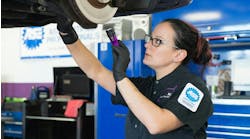How the fleet maintenance industry can help technicians succeed
While supply chain snarls continue to impact the fleet industry, there is a more pressing challenge we must tackle: technician shortage. Baby boomers are retiring or hanging up their tools to take leadership roles at a rate that far outpaces new technicians entering the industry. On top of this, even when paid a good wage, fleet maintenance isn’t exactly seen as a glamorous trade, causing a lot of young talent to choose alternative career paths.
Still, the role of the fleet technician is key to America’s economy. The country continues to shift from brick-and-mortar business to ecommerce, leading to more shipments, which means more trucks on the road and an increase in required maintenance.
At the end of the day, America would not be able to function as it does without the backbone of professional technicians keeping fleet vehicles on the road. Even during COVID-19 lockdowns, technicians were classified as essential workers. Fleet technicians are indispensable, which is why we must be doing more to grow their numbers and ensure they are successful in their careers.
Areas of excellence
In general, technicians excel from a mechanical and technical perspective, are great at problem solving, thinking on their feet, working efficiently, and doing what they do best—keeping vehicles moving. They are inquisitive, enjoy getting to the root of the problem, and grow their knowledge. Technicians are also fantastic with customer service and take pride in the way they interact with the driver or fleet manager, walking them through the process and showcasing their expertise.
Technicians are acutely aware of the condition the industry is in—they understand the technician shortage and the strain this causes—and recognize it as an opportunity to prove themselves. Because of this realization, more techs have a strategic mindset and are seeking to enhance their skills by attending training classes and finding other opportunities to be the best they can be.
Road to improvement
As new technologies like electric vehicles roll in, technicians are challenged with learning new parts, systems, and techniques. This includes learning new diagnostic equipment and computer technology, which is where a gap exists. A lot of techs can physically fix broken items but are challenged when it comes to diagnosing vehicles and understanding what exactly needs to be repaired.
Some technicians are more open to learning and are better at asking questions while others will just try to throw parts at the problem until something works. However, this may not be the most streamlined process and leadership can play a role in helping this improve.
How the industry can help techs succeed
There are many ways fleet leadership can help techs along their career path and set them up for success. Some options include assisting the technicians to get certified (such as ASE certified), tuition reimbursement, adequate support and empowerment, quarterly check-ins, and technical training.
Often, techs simply are not aware of all career path options so it’s up to leadership to present these possibilities. For example, if the technician does not want to be a tech anymore, they can be an asset in service sales, as a manager, or as a technical trainer to help pass their institutional knowledge along. Career mobility is available and should be communicated so technicians don’t feel stagnant or that they must leave to try something new.
If offering outside technical training is not accessible, a cost-effective alternative is to take advantage of the talent already in your shop. Techs come from all different backgrounds and have varying levels of knowledge—it’s likely they can each bring something unique to the table and teach others in their specific area of expertise. Featuring a new tech and training session each month can also motivate techs, making them feel more valued.
Level-up your technicians
If third-party technical training is within your capabilities, this is another way to level-up your techs. However, this can be a challenge, given OEMs are often protective of their training so techs can only get formal training from a dealership tied to the OEM. If the business has partnerships it can leverage, this would be a good source for training opportunities.
Another option is to attend a training school. For example, Cox Automotive Mobility’s FleeTec Academy, which is only open to Cox employees, help propel students in their careers and present all the possible paths they can take as a technician. The academy provides interpersonal skills coaching, training on specific OEM software packages and operating components, supplies tools (worth upward of $20,000), and offers training on a variety of trucks—from heavy-duty to medium- and small-sized vehicles.
While technicians should drive their own career path, leaders in fleet maintenance do play an important role in leveling up their technicians, helping recruit young talent and offering the industry skilled, professional techs. If the industry does its part to obtain, train, and retain techs, we can collectively help keep America moving.



